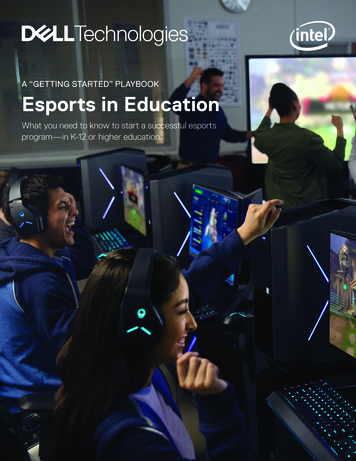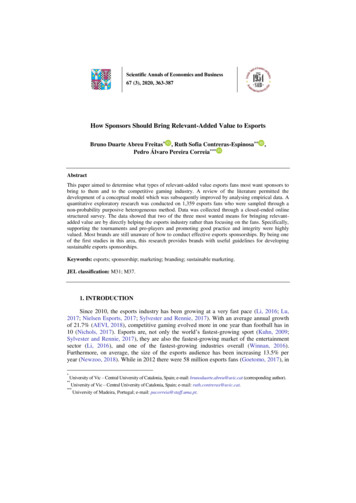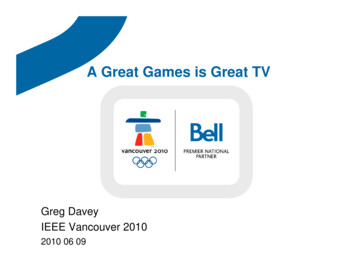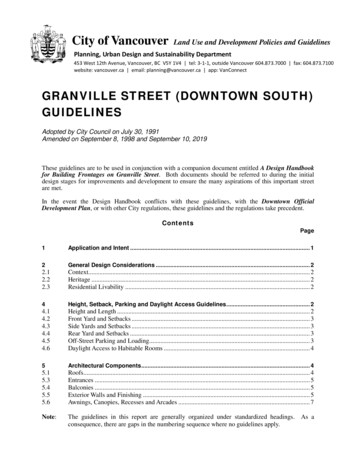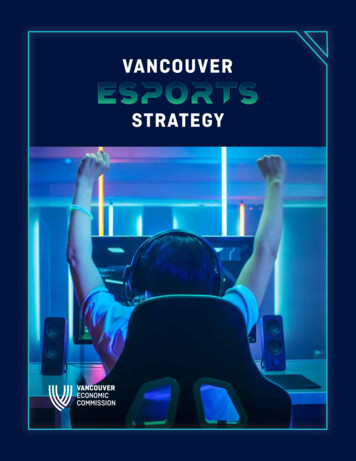
Transcription
Vancouver Esports Strategy:1
Vancouver Esports Strategy:23Table of ContentsSurvey responses 308 communityrespondents 20 esports-relatedorganizationsInterviews androundtables 5 roundtables 69 organizations 85 individual leadersProject Funders andStakeholders Western EconomicDiversification Canada TELUS Vancouver HotelDestination Association Tourism VancouverVancouver EconomicCommission Team Shawn CalderaClaire CampbellIngrid ValouJames RaymondDavid ShepheardShivam KishoreVancouver Esports StrategyExecutive Summary4Published February 2021What is Esports?10Introduction10Method2020: A digital sporting paradigm11The global market12Esports subsectors by platform14Esports Ecosystem Components16Over the course of this study, Vancouver Economic Commission (VEC) assembleda database of BC-based esports leaders comprising more than 100 experts,companies and industry organizations to collect local insights and assess the BCecosystem.Ecosystem leaders17Governments18Events and venues19VEC’s qualitative data collection employed a number of methods, beginningwith facilitated roundtable discussions (September 2019 through February2020) that discussed esports events, branding and sponsorships, scholasticesports, technology and infrastructure. Qualitative insights drawn from theseroundtables helped shape the topics and questions covered in subsequentone-on-one interviews with business advisors. In addition to pinpointingunderstanding successes, pain points, opportunities and areas requiring supportin the BC ecosystem, VEC collected additional insights from individual interviewswith industry experts to identify and map esports communities and industrynodes across BC.Education and talent development20Esports associations21Upon completion of the interviews and community mapping, VEC deployedsurveys to these communities to gather quantitative demographic, habitual andpredictive data. As BC esports communities were instrumental in distributingthe survey, responses featured in this report’s BC’s role and context sectionare reflective of participants in BC’s esports communities and distinct fromthe general population of gamers (casual or otherwise); therefore, they may beincidental to trends in non-esports video gaming communities.VEC contextualized its BC ecosystem assessment with additional 2018 GamingCommunity Data and 2019 Gaming Industry Data published by the EntertainmentAssociation of Canada. To provide further context for a gap analysis and strategy,VEC commissioned TwogNation – an esports organization specializing in esportsnetworking – to deliver an international assessment of Vancouver’s esportsecosystem, along with a survey of global best practices from 11 notable esportsready cities across North America, Europe and Asia.VEC respectfully acknowledges that it is located on the traditional, ancestral andunceded territory of the Skwx̱ wú7mesh (Squamish), Səl̓ílwətaʔ/Selilwitulh (TsleilWaututh) and xʷməθkʷəy̓ əm (Musqueam) Nations.International Best PracticesWhat we learned from 11 esports cities2223BC’s Esports Ecosystem Assessment26Canada’s role and context27BC’s esports ecosystem today29BC esports leaders44Gap Analysis46Investment and capital47Education and training50Professional associations54Immigration pathways55Strategy Recommendations56At the local level58At the international level64Conclusions70End Notes72Appendices73Appendix A – Acknowledgments: Study Partners & Contributors73Appendix B – Glossary of Terms73Appendix C – Investment Models75
Vancouver Esports Strategy: Executive Summary45Executive SummaryAs an industry, esports sits at the busy intersection of competitivesporting, games development and consumption, tourism and hospitality,and web-based content creation and broadcasting.The maturation of BC’s esports ecosystem willdiversify and strengthen the Western Canadianeconomy by attracting more internationalcompanies and players, generating revenuesfor the private and public sectors, and hostingmore international sporting events withsignificant direct and indirect spinoff benefits,including job creation for local workers.For the region to assume a global leadershiprole, however, there must be comprehensive,open-minded and strong cooperationbetween local tourism, telecommunications,venues and athletic talent; as well as supportand establishment of government policy,community-driven governance, infrastructuredevelopment, and corporate and public-sectorsponsorship.This report includes an overview of theglobal and local esports industry, including asummary analysis of leading hubs acting onesports initiatives and strategies.The report will: Help readers determine the potentialesports economic opportunity inVancouver and onsorship Establish understanding of the stepsrequired to amplify and enhanceesports across the region, and supportcoordination within stakeholdersRights feeRevenue sharing (prize, salary, fee)Betting CompaniesConsumers and Fans Facilitate BC industry leaders’ andpolicymakers’ decision-making process byproviding insights into other cities’ successstrategiesEsports Teams Help the local esports community developvaluable partnerships and initiatives withglobal esports players and companies Build on insights with a proposed set ofstrategy recommendations and tacticsaimed at transforming Vancouver and BCinto an international esports hubevents; government initiatives that facilitateesports’ development as an industry; and othermiscellaneous but critical elements that advancethe state of esports through sporting or industrydevelopment. Our ecosystem and gap analysis,along with strategy recommendations, are basedon the relationships between these foundationalcomponents and their presence in the ecosystem.Figure 1.1 – International esports ecosystem mapTournamentOrganizersGame DevelopersBroadcast StudiosPlayersThanks to the Vancouver region’s proven trackrecord in hosting international sporting events,talented community and committed fanbase,and attractiveness as a tourism destination,Vancouver and BC have all the foundationalqualities to capitalize on an industry set todouble its global revenue from 1.1 billion in2019 to 2.2 billion in 2022. These qualities arefurther augmented by the province’s recentdemonstration of economic resilience andpublic health management in the contextof the COVID-19 pandemic, combined withincreased global interest in esports facilitatedby lockdown conditions and physicaldistancing measures.Figure 1.1 illustrates the general relationshipsbetween notable player, tournament organizerand fan stakeholder groups or organizations.The reciprocal interplay between elementsin these key areas result in activities thatcharacterize a healthy esports hub, described infour groups or issues: the presence and leadershipof esports participants; the organization of esportsTournament PlatformsStreaming PlatformsVenuesSponsors,Brands andInvestors
Vancouver Esports Strategy: Executive Summary671.2 Issue tree for becoming an esports hubPresence of esportsecosystem participantsVancouver TitansAn independently conducted assessment ofVancouver’s esports industry by TwogNationindicates that Vancouver has significantroom to grow into its potential. ThoughVancouver has established quality componentsof a robust esports industry – includingevents hosting and organization prowess,a highly innovative and entrepreneurialstartup ecosystem, and robust video gamesdevelopment and tech sectors – they havegenerally operated independently from oneanother. These siloes present a significanthurdle for Vancouver’s development as anesports city, especially when compared to 11 ofthe top esports hubs around the world.Expert insights gathered through VECfacilitated industry roundtables and one-onone interviews agree that until better cohesionis achieved, Vancouver will lag behind leadingesports hubs in North America, WesternEurope and Asia, and will continue to remaincomparatively unknown on the global stage.Vancouver is home to offices of prominentinternational game publishers withmultibillion-dollar market caps, such as TakeTwo Interactive ( 19.05 billion), ElectronicArts ( 38.36 billion) and Nintendo ( 66.99billion). The city is also home to numerousmultifunctional world-class stadiums andvenues like Rogers Arena and the VancouverConvention Centre. When considered alongsidededicated esports arenas such as The GamingStadium and Net8 esports arena, Vancouver’sproven sport and international conferencehosting history are tremendous assets,complemented by favorable visa policies forinternational esports players travelling tocompete in tournaments. All of these factorsshould combine to elevate Vancouver’sreputation as an inviting and successfulesports city. However, despite Vancouver’sproven capacity to host major sporting events,there have been no high-profile, internationalesports events held in the region, save fortwo major tournaments organized in 2017 and2018 (NA League of Legends ChampionshipSeries and Dota 2: The International 2018tournament).Esports associations play a pivotal rolein locating, understanding and unitingvarious ecosystem players, and may alsobe set up to coordinate esports events.Although Vancouver’s esports communitybenefits from the anchoring influences ofstrong university and college-level gamingorganizations, several ranked league teams, itsrobust entertainment sector, and communitygrassroots organizations across BC, thereare currently no major esports associationsor chapters functioning in Vancouver. Assuch, the creation and operation of a wellfunctioning association could be highlyeffective in unlocking Vancouver’s potential,and moving the dial from a modest, steady riseto accelerated growth.Levers that make a city an esports hubEcosystem insights and gap analysisLevers thatmake a cityan esportshubOrganization ofesports eventsGovernment initiativesto facilitate esportsdevelopmentOther elementsof esports successFigure 1.2 illustrates some of the tactics,policy-levers and measures that Vancouverwill need to catalyze, acquire or implement inorder to compete with leading esports hubs.BC’s largest regional esports hub is theSouthwest Mainland, which includes theMetro Vancouver and Fraser Valley regionaldistricts. Other hubs include Vancouver Island,whose primary esports activity centres in thesouth, around Victoria; the Southern Interiorcluster, centred in Kelowna; and Northern BC,where most esports activity revolves aroundPrince George and its university district. Each1.1Acquisition of game publishers1.2Acquisition of esports teams1.3Acquisition of streaming platforms1.4Acquisition of tournament organizers1.5Acquisition of tournament platforms1.6Acquisition of broadcast studios2.1Organization of tournaments2.2Establishment of city leagues2.3Availability of venues and training centres3.1Government subsidies3.2Registration system for esports athletes and formalization of esports3.3Residency rights for esports athletes4.1Presence of esports associations4.2Existence of esports education programs4.3Private investments4.4Existence of grassroot communities and other local/regional aspectsindustry and community node is anchored bythe largest urban centres in region (Vancouver,Victoria, Kelowna and Prince George), and isclustered around reliable broadband accessand high speeds. Vancouver is the largest andmost active of these four regional esportsnodes; for this reason, the recommendationsoutlined in this report focus on Vancouver.However, each node has its own industryconnections, business operations, andgrassroots community events, and this report’sstrategy recommendations may be read,considered and applied towards them as well.
Vancouver Esports Strategy: Executive Summary89RecommendationsCOVID-19 lockdown measures have had animmense effect on esports and the videogames industry, with all game segments seeingan increase in engagement and revenuesas a result of amplified consumer interestduring self-isolation. Consumer spending onmobile gaming has particularly soared, owingto its low barriers to entry and accessibility.However, lockdown measures have alsoimpacted many grassroots community groups,some of which sprang up because certainhardware limitations require tournamentsof console-exclusive games titles to be heldin person. The struggles of some communitygroups, forced to move entirely online orswitch to remote-only events, have alsoexposed the limitations of BC’s endemicbroadband and internet infrastructure inremote communities.The gap analysis spends some time discussingoptions for education-related esports tacticsat both the secondary and post-secondarylevel, and touches on hoped-for advancementsin infrastructure, staffing and policyrequirements. Generally, the esports industryadvocates for the introduction of new curriculaas a lever to improve its standing and thequality of work-ready talent for the sector andsupport industries. However, to thoughtfullyimplement and integrate these proposedcurriculum changes requires significantadditional research and engagement withvarious public funding and regulatory bodies,including Ministries of Education, regionalschool districts and municipal school boards.There are two main stages to this report’s recommendations: the local stage andthe international stage. The local stage’s set of actions focuses on introducingand developing the key factors necessary to unlock cohesion, growth andcollective planning in the Vancouver and BC ecosystem; these actions are alsoscalable to the rest of Western Canada. The international stage builds on thelocal stage to enhance the city and province’s international reputation andestablish Vancouver and BC as a global esports hub.While it’s not necessary to complete the first stage prior to beginning workon the second, establishing a rock-solid local ecosystem and community willonly improve Vancouver and BC’s position, and prepare the region for successinternationally.These recommendations are directed broadly towards ecosystem leaders,specifically policymakers, bureaucrats, esports company founders, communityorganizers, investors, and prospective events and infrastructure sponsors.The Gaming StadiumStage 1: LocalÐ Improve cohesion of local esportsecosystemÐ Establish an esports associationÐ Introduce policies to formalizeesports as a form of traditionalsportsÐ Introduce policies to improveesports infrastructure and clusterdevelopmentÐ Encourage local esports events andesports in educationÐ Build investor confidence in esportscompaniesStage 2: InternationalÐ Attract international esportsleaders, such as games publishers,event organizers, sports teams, andtraining institutions and academies,to open new offices in VancouverÐ Host international esports eventsÐ Engage and guide cross-borderinvestorsÐ Refine pathways and processes foresports-related immigration andworkÐ Develop and distributeinternational-facing marketingmaterials
Vancouver Esports Strategy: Introduction10112020: A digitalsporting paradigmEsports is organized, competitive video gaming.As a form of sporting competition, its scale ranges from neighbourhood pick-upgames and tournaments to professional leagues culminating in high-productionvalue finals played in stadiums packed with tens of thousands of fans, and watchedonline by millions more.Traced back to the early days of arcade machines in the 1970s, esports is a directproduct of the 152 billion global video game market. Despite its overlap withtoday’s games industry, esports’ competitive sporting characteristics distinguish itas a standalone industry with unique needs. While NewZoo, a leading provider ofgames and esports industry market intelligence, valued the global esports industryat US 1.1 billion in 2019, prior to the pandemic, the sector’s value was projected tonearly double to US 2.17 billion as soon as 2023.1 2 While the pandemic has caused adrop in revenues attributed to a drop in live audience ticket sales, NewZoo assertsboth supply (audience) and demand (organizers) have remained steady.3This is good news, because the past decade has seen esports break into mainstreaminterest and coverage: traditional sports broadcasting channels are now runningesports programming, and sports teams and associations like the National Basketball Association (NBA) and Major League Soccer (MLS) have begun to conduct theirown esports events. According to NewZoo, the total esports audience will grow by 11.7percent over 2019 levels, surpassing 490 million viewers by the end of 2020.4 Nearlyhalf of those viewers are esports enthusiasts, while the rest are casual spectators.At a time when many of the world’s industries slowed and shiftedtowards remote working protocols, the esports industry barelyregistered the economic effects of the COVID-19 pandemic. Even prior tothe spike in interest attributable to quarantine behaviour, the esportsindustry was already set to benefit from shifting media consumptionpatterns, including increased content streaming habits and marketpenetration of esports-capable gaming devices. Communities wereanchored, publishers secured their fan bases, and the world reached atipping point of digital maturity – in broadband infrastructure, servicesand knowledge – particularly in urban centres.In 2020, esports experienced an exponential increase in interest fromboth gaming and non-gaming communities – a direct result of theCOVID-19 pandemic and resulting lockdown and physical distancingmeasures. Traditional and staple sporting events pivoted theirapproaches to delivering content, and companies like the sportsequipment and footwear manufacturer ASICS, used VR/AR (virtual andaugmented reality) to launch products on public livestreams.5Additionally, many regular spectators turned to esports versions of theirpreferred sport. Broadcasts on ESPN, TSN and other sports networkshave featured esporting counterparts of NBA, National Hockey League(NHL) and – most notably – the National Association for Stock Car AutoRacing (NASCAR), whose iRacing event racked up 1.3 million viewers onlivestreams.6Content creators for sites like Twitch, YouTube and Mixer likewisesaw unprecedented growth during the pandemic. Twitch, a popularbroadcasting site for digital content creators, had a pre-pandemicaudience of 1.2 million viewers per month; since the lockdown, thecompany has seen an overall audience increase of 24 percent.720.8MThe esports industry is at an inflection point.1.26M1.07MNot all games become esports. While any multiplayer game with competitiveelements and a strong fanbase has the potential to become an esport, those thatsucceed share three fundamental values: competition, compelling content, andconnected community.Figure 2.1 – Average concurrent viewers on TwitchSource: TwitchTracker.com201820192020
Vancouver Esports Strategy: Introduction12The globalmarketUS 1.1 billionglobal revenuein 2019Trend spotlight: Console and PC gaming revenuesPC and console hardware technologies have made significant strideswith the advent of microprocessors, with consoles generally leadingin form factor innovation, including portable gaming, while PCgaming leads in areas pertaining to raw computational power andbleeding-edge technology for professional gamers.12Esports has maintained rapid growth at an average rate of 27 percentfrom 2017 to 2020, reaching US 1.1 billion in 2019.8 Global revenuesare forecast to continue growing at a CAGR of 16 percent from 2020to 2022, with North America, Asia and Western Europe accountingfor approximately 90 percent of overall revenues. According toTwogNation, approximately half of esports fans are based out ofAsia.9Esports audiences are growing in tandem with revenues, a trend thatis forecasted to continue at a combined annual rate of 12 percentfrom 2020 to 2022.10 Notably, half of the global esports audience isbased in Asia: China alone accounts for approximately 30 percent ofglobal audiences, triple the size of North America’s audience; SouthKorea accounts for approximately three percent of global audiences.NewZoo has revised its original 2020 revenue generation estimatesfrom US 973.9 million to US 950.3 million. However, the marketresearch group has cited in-person ticket sales and merchandisingpurchase as the cause of the fall in revenues, noting that neither theesports audience nor organizers have dwindled and concluding thatboth demand and existing levels of supply remain steady.11729 millionplayers6.8% y-o-yrevenue growthUS 45.2 billionprojected revenueThe industry’s growing significance has spurred companies andgovernments in international hubs to enter and support the growthof their local esports industries.1.3 billionplayersConsoleThe three major players in the console market are Sony InteractiveEntertainment (PS4), Nintendo (Nintendo Switch) and Microsoft(Xbox One)13. Each of these players relies heavily on intellectualproperty and exclusive titles to drive sales of games and consoleunits. Consoles and games sales volumes surged in 2020 Q2 despiteaging console hardware as more casual gamers rushed to entertainthemselves in lockdown. Analysts expect sales to spike with theupcoming generation of new consoles. Estimated 729 million players Anticipated 6.8 percent revenue growth year-over-yearto US 45.2 billion Physical distribution, cross-company collaboration andcertification are a major part of console development;as such, this market segment may be affected by theeconomic slowdownPC (personal computer)While competitive PC gaming has been feasible for decades thanksto local area network (LAN) capabilities, the viability of improvedaccessibility and options for high-speed internet have allowedcompetitive play to become mainstream. Estimated 1.3 billion players 4.8 percent growth year-over-year to US 36.9 billion in 20204.8% y-o-yrevenue growthUS 36.9 billionprojected revenue All new growth and spending may be directly attributableto COVID-19 PC games moved from physical to digital distribution years priorto consoles achieving the same transitionSource(s): NewZoo, vgchartz13
Vancouver Esports Strategy: Introduction14Trend spotlight: Mobile esports in AsiaAccording to NewZoo, mobile or pocket gaming has been the globalgames market’s fastest-growing segment for the past five years, occupyingaround 40 percent of market share.14 However, in the Americas and Europe,mobile esports continues to lag behind PC and console esports, owing toa completely different social dynamic with mobile games that TwogNationattributes to distinct cultural trends.Asia’s rapid mobile esports growth is catalyzed by several factors, including:Esports subsectors byvideo gaming platformGlobalVideo GamesMarket9.3% y-o-yforecast revenue growthfor video games marketin 2020The esports industry is segmented by modes of gameplay –namely, the PC, mobile, tablet and console platforms. Each ofthese market segments follows the same esports ecosystemstructure, but trends are generally led and driven by differentstakeholders (i.e. games publishers, investors, tournamentorganizers). However, some key players and industry leaderscompete in both PC and mobile segments (e.g. Tencent,NetEase).The global video games market is forecasted to generaterevenues of US 159.3 billion in 2020, representing year-overyear growth of 9.3 percent. This growth is driven by a complexseries of increased consumer interest and spending acrossall platform segments as a result of coronavirus lockdownmeasures – a positive trend that has persisted despite COVID19-related delays in anticipated big-name title releases and aglobal economic downturn. Greater cultural acceptance of pocket and handheld gaming Greater market penetration owing to rising use of mobile devicesin the regionMobile Gamesin China Additional room for growth; in 2019, China had achievedapproximately 60 percent market penetration for approximately850 million users, with significant potential for expandedaudiences Government support for esports, including favorable policies forall industry segments Lower barriers to entry in comparison to PC and console games850 million Lower barriers to access (i.e. not necessary to go to mobile cafesfor broadband)users in 201960%market penetrationin 2019 Less complex development process for mobile games whencompared to console or PC Concentration of key mobile esports games publishers’ offices Increased spending and consumer engagement as a result ofcoronavirus lockdown measuresExploring the viability of duplicating these favourable conditions for mobileesports in BC and Canada could be a topic of future study.15
Vancouver Esports Strategy: Ecosystem Components1617Ecosystem leadersThese ecosystem leaders advance the profile of esports among mainstreamaudiences, or operate businesses that create and maintain spaces in whichesports activities and events may take place.Game developers andpublishersIdentifying and understanding key playersin a healthy esports ecosystemEcosystem leadersGovernmentsEvents and venuesGame developers andpublishers create and distributevideo games. Depending ontheir business model, primaryrevenue sources stem fromgame and in-game contentsales to players. Anotherrevenue stream is licensing, andrights-related fees gained fromtournament organizers hostingtournaments for their game.Additionally, game developersoften act as tournamentorganizers themselves;examples include RiotGames’ League of LegendsChampionships and ValveCorporation’s The Internationalfor their Dota 2 title.Teams and playersEducation and talent developmentEsports associationsPrivate investmentsCompetitive players are acentral pillar of the esportsindustry. As with traditionalsports athletes, activities suchas trading players, brand deals,sponsorships and marketingcampaigns are fixtures of theesports world. Esports teamorganizations often own andoperate facilities and trainingpersonnel for the players theyrecruit and train; they alsofrequently manage multipleteams competing in differentesports titles. Leading teamsaround the world includeTeam SoloMid (TSM), Cloud9,G2 Esports and SK Telecom T1.According to Forbes, seven outof 10 of the highest-valuationteams are based in the US.Streaming platformsVideo streaming platforms inesports enable players andcontent creators to uploadtheir content or livestreamtheir gaming activities. Theseconsist of juggernauts such asTwitch, YouTube and Mixer, inaddition to newer players in thefield such as Juked.gg. A largeportion of the esports industry’srevenue comes from streamingsites.Third-party tournamentorganizersWhile first-party developersmay host their own events,third-party companies focuson, and specialize in, organizingesports events (e.g. ESL, MLG).These companies share revenuewith game developers, usuallyin the form of licensing fees.Additional revenue comesfrom merchandise sales, brandadvertising, and rights fees frombroadcast studios and streamingplatforms. Part of this revenuefeeds into tournament prizepools for winning teams.Community platformsEsports community platformsare online platforms whereplayers can register andparticipate in tournaments(e.g. Battlefy, FACEIT), bet onevents (Betway) and interactwith other players (Discord).Tournament organizers (gamepublishers and third-partyorganizers) share revenuewith tournament platformsto fund tools needed to buildtheir competitive community.For instance, tournamentcommunity platforms providegame developers with tools tointegrate esports leagues intotheir titles and help third-partyorganizers create, distribute andmanage their competitions.Broadcast studiosBroadcast studios producevideo content covering esportstopics, including commentatingon tournaments and producinganalytical programs (e.g.Maincast, Beyond The Summit,VGBootCamp, RuHub, Imba TV).Broadcast studios generaterevenues through brandadvertising and paying rightsfees to tournament organizersfor their content. In addition tostreaming online content, thesecompanies may air their contenton select cable services (e.g.GINX.tv in Canada).
18Vancouver Esports Strategy: Ecosystem ComponentsGovernmentsEvents and venuesSupportive governments are a critical component of successful global ecosystems, ableto provide subsidies and industry legitimacy; shape residency and immigration rightsfor esports athletes; help with international trade and export logistics; and assist withimproving options for accredited esports courses in the education system.Events are the lifeblood of the esports ecosystem. Whether online, in-person, or somecombination of both, events generate revenue; engage fans, investors and communities;and showcase athletes and gameplay. Successful esports cities and regional hubs alsodemonstrate support and acceptance of esports events and activities.and allocation of data, visasand funding. Another criticaloutcome of governmentsrecognizing esports as alegitimate career field is theinvolvement and buy-in ofeducation ministries and otherdepartments that shape andset school curricula, with thepotential outcome of cultivatinglocal talent pools.Residency andimmigration rightsGovernment subsidiesLegitimacy and formalizationDepending on the scaleand nature of governmentinvolvement, governmentsubsidies may go towardsfunding startups andenterprises, includingsubsidizing rent and otheroverheads such as hardwarepurchases, esports businessattraction and expansions,infrastructure and venueconstruction, and support forathletes.At minimum, formal recognitionof the esports industry bygovernments is a prerequisitefor effective policy, conferringlegitimacy and – to someextent – confidence in thesector. Effectively implemented,formalization could eliminateambiguity around esportsas a sector, such as withinimmigration or censusdepartments, and facilitatethe collection, processingThere are numerous examplesof esports athletes encounteringdifficulties and bureaucraticconfusion when attemptingto cross a border for aninternational tournament orlea
2.3 viiit o venes n trining centres Government initiatives to facilitate esports development 3.1 overnment ssiies 3.2 Registrtion system or esorts thetes n ormition o esorts 3.3 Resienc rights or esorts thetes 1.2 Issue tree for becoming an esports hub Figure 1.2 illustrates some of the tactics, policy-levers and measures that Vancouver


